- Home
- Albert Camus
Resistance, Rebellion, and Death Page 18
Resistance, Rebellion, and Death Read online
Page 18
In the battles of our time I have always been on the side of the obstinate, on the side of those who have never despaired of a certain honor. I have shared and I still share many of the contemporary frenzies. But I have never been able to get myself to spit, as so many others do, on the word “honor.” Doubtless because I was and am aware of my human weaknesses and of my injustices, because I instinctively knew and still know that honor (like pity) is an unreasonable virtue that takes the place of justice and reason, which have become powerless. The man whose blood, and extravagances, and frail heart lead him to the commonest weaknesses must rely on something in order to get to the point of respecting himself and hence of respecting others. This is why I loathe a certain self-satisfied virtue, I loathe society’s dreadful morality because it results, exactly like absolute cynicism, in making men despair and in keeping them from taking responsibility for their own life with all its weight of errors and greatness.
The aim of art, the aim of a life can only be to increase the sum of freedom and responsibility to be found in every man and in the world It cannot, under any circumstances, be to reduce or suppress that freedom, even temporarily. There are works of art that tend to make man conform and to convert him to some external rule. Others tend to subject him to whatever is worst in him, to terror or hatred. Such works are valueless to me. No great work has ever been based on hatred or contempt. On the contrary, there is not a single true work of art that has not in the end added to the inner freedom of each person who has known and loved it. Yes, that is the freedom I am extolling, and it is what helps me through life. An artist may make a success or a failure of his work. He may make a success or a failure of his life. But if he can tell himself that, finally, as a result of his long effort, he has eased or decreased the various forms of bondage weighing upon men, then in a sense he is justified and, to some extent, he can forgive himself.
At the source of every work there is an experience. It may be a brief and brutal experience, a trauma. It may also be a protracted experience, generally the experience of childhood and adolescence. For you, to begin with, there was the Mediterranean and poverty. But with maturity come other experiences to influence and color one’s early impressions. For you they took the form of war and Resistance. Have not the last few years likewise been the source of a new experience? In what way, and what have they brought you?
Yes, there was the sun and poverty. Then sports, from which I learned all I know about ethics. Next the war and the Resistance. And, as a result, the temptation of hatred. Seeing beloved friends and relatives killed is not a schooling in generosity. The temptation of hatred had to be overcome. And I did so. This is an experience that counts.
Then the years since the Liberation were largely marked, in my case, by the experience of a solitary struggle. I had friends, to be sure, good, generous, and loyal friends, the mere thought of whom warms my heart today. But the decisions I had to make, which counted the most for me—the decision to write The Rebel, for instance—were solitary and difficult decisions. And also what followed. But at the same time history progressed. East Berlin, Poznan, Budapest … A gigantic myth collapsed. A certain truth, which had long been disguised, burst upon the world. And if the present is still spattered with blood and the future still dark, at least we know that the era of ideologies is over, and the force of resistance, together with the value of freedom, gives us new reasons for living.
That’s it. And of course one must add purely personal experiences.
We spoke of inserting a work into its time. But it also belongs to a current of thought that is, in a way, geographical. It strikes me that your work, like that of several contemporary writers—I am thinking particularly of Silone and Ortega y Gasset—can be said to belong to Europe. Are you aware of this and does that intellectual Europe seem to you a reality?
Yes, I am aware of such a Europe and I believe it foreshadows our political future. The more French I feel, the more I believe this. No one is more closely attached to his Algerian province than I, and yet I have no trouble feeling a part of French tradition. Consequently, I learned, as naturally as we learn to breathe, that love of one’s native land can broaden without dying. And, finally, it is because I love my country that I feel European. Just take for example Ortega y Gasset, whom you were right to mention. He is perhaps the greatest of European writers after Nietzsche, and yet it would be hard to be more Spanish. Silone speaks to all of Europe, and the reason I feel so close to him is that he is also so unbelievably rooted in his national and even provincial tradition.
Unity and diversity, and never one without the other—isn’t this the very secret of our Europe? Europe has lived on its contradictions, flourished on its differences, and, constantly transcending itself thereby, has created a civilization on which the whole world depends even when rejecting it. This is why I do not believe in a Europe unified under the weight of an ideology or of a technocracy that would overlook these differences. Any more than I believe in a Europe left to its differences alone—in other words, left to an anarchy of enemy nationalisms.
If Europe is not destroyed by fire, it will come into being. And Russia will in time be added to it, with its individual differences. It will take more than Mr. Khrushchev to make me forget what links us to Tolstoy, to Dostoevsky, and to their people. But that future is threatened by war. Let me repeat, this is our wager. But it is one of the few wagers worth accepting.
You are an Algerian French writer. This is indeed what you made a point of emphasizing when you were awarded the Nobel Prize. But when you are aware of being an Algerian Frenchman, certainly you are not defining yourself by opposition to Algerians not of French origin. Albert Camus, a Frenchman from Algeria—doesn’t this mean that you feel a solidarity with all Algerians? How can this be and how does that Algeria fit into the spiritual Europe to which you are also aware of belonging?
My role in Algeria never has been and never will be to divide, but rather to use whatever means I have to unite. I feel a solidarity with everyone, French or Arab, who is suffering today in the misfortune of my country. But I cannot all alone rebuild what so many men persist in destroying. I have done what I could. I shall begin again when there is again a chance of helping to rebuild an Algeria freed from all hatreds and all forms of racism. But, to limit ourselves to the domain we have chosen, I merely want to remind you that, simply by virtue of a generous interchange and a real solidarity, we have built up a community of Algerian writers, both French and Arab writers. That community is cut in two, for the time being. But men like Feraoun, Mammeri, Chraïbi, Dib, and so many others have taken their place among European writers. Whatever the future may be, and however dark it looks to me, I am sure that this cannot be forgotten.
Frequently when speaking of French culture you have used the word “rebirth.” Not only do you wish for it, but it also seems that at times you perceive its first promise. What may be the form of that rebirth? What are the signs of it?
The change in generations taking place on all levels is one of the first signs. The quality of the new generation is another, as well as the increasing unwillingness to adopt slogans or ideologies and the return to less pretentious and more tangible values.
Europe (and France) has not yet emerged from fifty years of nihilism. But the moment people begin rejecting the mystifications on which that nihilism is based, then hope is possible. The whole question is to know whether or not we shall develop faster than the rocket with a nuclear warhead. And, unfortunately, the fruits of the spirit are slower to ripen than intercontinental missiles. But, after all, since atomic war would divest any future of its meaning, it gives us complete freedom of action. We have nothing to lose except everything. So let’s go ahead. This is the wager of our generation. If we are to fail, it is better, in any case, to have stood on the side of those who choose life than on the side of those who are destroying.
In all your work there coexist philosophical pessimism and, nonetheless, not optimism but a sort of confidence.
Confidence in the spirit rather than in man, in nature rather than in the universe, in action rather than in its results. Do you think this attitude—which is that of the rebel, for the value of the revolt makes up for the world’s absurdity—can be adopted by the majority or is it condemned to remain the privilege of a few wise men?
Is that position really so special? And do not the men of today, threatened and yet resisting, live in this manner? We stifle and yet survive, we think we are dying of grief and yet life wins out. The men of our time, whom we encounter in the streets, show in their faces that they know. The only difference is that some of them show more courage. Besides, we have no choice. It is either that or nihilism. If our societies must plunge into nihilism, whether totalitarian or bourgeois, then those individuals who refuse to give in will stand apart, and they must accept this. But in their place and within their means, they must do what is necessary so that all can live together again.
Personally, I have never wanted to stand apart. For the man of today there is a sort of solitude, which is certainly the harshest thing our era forces upon us. I feel its weight, believe me. But, nevertheless, I should not want to change eras, for I also know and respect the greatness of this one. Moreover, I have always thought that the maximum danger implied the maximum hope.
One cannot avoid tackling certain subjects today. The most serious one is a problem for all men: in the struggles dividing the world today, must we really be willing to forget all that is bad on one side to fight what is worse on the other?
Before he died in combat in the last war, Richard Hilary found the phrase that sums up this dilemma: “We were fighting a lie in the name of a half-truth.” He thought he was expressing a very pessimistic idea. But one may even have to fight a lie in the name of a quarter-truth. This is our situation at present. However, the quarter-truth contained in Western society is called liberty. And liberty is the way, and the only way, of perfectibility. Without liberty heavy industry can be perfected, but not justice or truth. Our most recent history, from Berlin to Budapest, ought to convince us of this. In any case, it is the reason for my choice. I have said in this very place that none of the evils totalitarianism claims to remedy is worse than totalitarianism itself. I have not changed my mind. On the contrary, after twenty years of our harsh history, during which I have tried to accept every experience it offered, liberty ultimately seems to me, for societies and for individuals, for labor and for culture, the supreme good that governs all others.
CREATE DANGEROUSLY
(Lecture given at the University of Uppsala in December 1957)
AN ORIENTAL wise man always used to ask the divinity in his prayers to be so kind as to spare him from living in an interesting era. As we are not wise, the divinity has not spared us and we are living in an interesting era. In any case, our era forces us to take an interest in it. The writers of today know this. If they speak up, they are criticized and attacked. If they become modest and keep silent, they are vociferously blamed for their silence.
In the midst of such din the writer cannot hope to remain aloof in order to pursue the reflections and images that are dear to him. Until the present moment, remaining aloof has always been possible in history. When someone did not approve, he could always keep silent or talk of something else. Today everything is changed and even silence has dangerous implications. The moment that abstaining from choice is itself looked upon as a choice and punished or praised as such, the artist is willy-nilly impressed into service. “Impressed” seems to me a more accurate term in this connection than “committed.” Instead of signing up, indeed, for voluntary service, the artist does his compulsory service. Every artist today is embarked on the contemporary slave galley. He has to resign himself to this even if he considers that the galley reeks of its past, that the slave-drivers are really too numerous, and, in addition, that the steering is badly handled. We are on the high seas. The artist, like everyone else, must bend to his oar, without dying if possible—in other words, go on living and creating.
To tell the truth, it is not easy, and I can understand why artists regret their former comfort. The change is somewhat cruel. Indeed, history’s amphitheater has always contained the martyr and the lion. The former relied on eternal consolations and the latter on raw historical meat. But until now the artist was on the sidelines. He used to sing purposely, for his own sake, or at best to encourage the martyr and make the lion forget his appetite. But now the artist is in the amphitheater. Of necessity, his voice is not quite the same; it is not nearly so firm.
It is easy to see all that art can lose from such a constant obligation. Ease, to begin with, and that divine liberty so apparent in the work of Mozart. It is easier to understand why our works of art have a drawn, set look and why they collapse so suddenly. It is obvious why we have more journalists than creative writers, more boy-scouts of painting than Cézannes, and why sentimental tales or detective novels have taken the place of War and Peace or The Charterhouse of Parma. Of course, one can always meet that state of things with a humanistic lamentation and become what Stepan Trofimovich in The Possessed insists upon being: a living reproach. One can also have, like him, attacks of patriotic melancholy. But such melancholy in no way changes reality. It is better, in my opinion, to give the era its due, since it demands this so vigorously, and calmly admit that the period of the revered master, of the artist with a camellia in his buttonhole, of the armchair genius is over. To create today is to create dangerously. Any publication is an act, and that act exposes one to the passions of an age that forgives nothing. Hence the question is not to find out if this is or is not prejudicial to art. The question, for all those who cannot live without art and what it signifies, is merely to find out how, among the police forces of so many ideologies (how many churches, what solitude!), the strange liberty of creation is possible.
It is not enough to say in this regard that art is threatened by the powers of the State. If that were true, the problem would be simple: the artist fights or capitulates. The problem is more complex, more serious too, as soon as it becomes apparent that the battle is waged within the artist himself. The hatred for art, of which our society provides such fine examples, is so effective today only because it is kept alive by artists themselves. The doubt felt by the artists who preceded us concerned their own talent. The doubt felt by artists of today concerns the necessity of their art, hence their very existence. Racine in 1957 would make excuses for writing Bérénice when he might have been fighting to defend the Edict of Nantes.
That questioning of art by the artist has many reasons, and only the loftiest need be considered. Among the best explanations is the feeling the contemporary artist has of lying or of indulging in useless words if he pays no attention to history’s woes. What characterizes our time, indeed, is the way the masses and their wretched condition have burst upon contemporary sensibilities. We now know that they exist, whereas we once had a tendency to forget them. And if we are more aware, it is not because our aristocracy, artistic or otherwise, has become better—no, have no fear—it is because the masses have become stronger and keep people from forgetting them.
There are still other reasons, and some of them less noble, for this surrender of the artist. But, whatever those reasons may be, they all work toward the same end: to discourage free creation by undermining its basic principle, the creator’s faith in himself. “A man’s obedience to his own genius,” Emerson said magnificently, “is faith in its purest form.” And another American writer of the nineteenth century added: “So long as a man is faithful to himself, everything is in his favor, government, society, the very sun, moon, and stars.” Such amazing optimism seems dead today. In most cases the artist is ashamed of himself and his privileges, if he has any. He must first of all answer the question he has put to himself: is art a deceptive luxury?
I
The first straightforward reply that can be made is this: on occasion art may be a deceptive luxury. On the poop deck of slave galleys it is possibl
e, at any time and place, as we know, to sing of the constellations while the convicts bend over the oars and exhaust themselves in the hold; it is always possible to record the social conversation that takes place on the benches of the amphitheater while the lion is crunching the victim. And it is very hard to make any objections to the art that has known such success in the past. But things have changed somewhat, and the number of convicts and martyrs has increased amazingly over the surface of the globe. In the face of so much suffering, if art insists on being a luxury, it will also be a lie.
Of what could art speak, indeed? If it adapts itself to what the majority of our society wants, art will be a meaningless recreation. If it blindly rejects that society, if the artist makes up his mind to take refuge in his dream, art will express nothing but a negation. In this way we shall have the production of entertainers or of formal grammarians, and in both cases this leads to an art cut off from living reality. For about a century we have been living in a society that is not even the society of money (gold can arouse carnal passions) but that of the abstract symbols of money. The society of merchants can be defined as a society in which things disappear in favor of signs. When a ruling class measures its fortunes, not by the acre of land or the ingot of gold, but by the number of figures corresponding ideally to a certain number of exchange operations, it thereby condemns itself to setting a certain kind of humbug at the center of its experience and its universe. A society founded on signs is, in its essence, an artificial society in which man’s carnal truth is handled as something artificial. There is no reason for being surprised that such a society chose as its religion a moral code of formal principles and that it inscribes the words “liberty” and “equality” on its prisons as well as on its temples of finance. However, words cannot be prostituted with impunity. The most misrepresented value today is certainly the value of liberty. Good minds (I have always thought there were two kinds of intelligence—intelligent intelligence and stupid intelligence) teach that it is but an obstacle on the path of true progress. But such solemn stupidities were uttered because for a hundred years a society of merchants made an exclusive and unilateral use of liberty, looking upon it as a right rather than as a duty, and did not fear to use an ideal liberty, as often as it could, to justify a very real oppression. As a result, is there anything surprising in the fact that such a society asked art to be, not an instrument of liberation, but an inconsequential exercise and a mere entertainment? Consequently, a fashionable society in which all troubles were money troubles and all worries were sentimental worries was satisfied for decades with its society novelists and with the most futile art in the world, the one about which Oscar Wilde, thinking of himself before he knew prison, said that the greatest of all vices was superficiality.

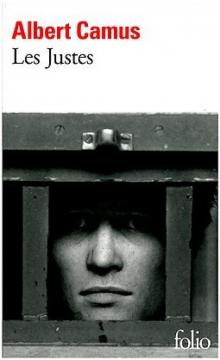 Les Justes
Les Justes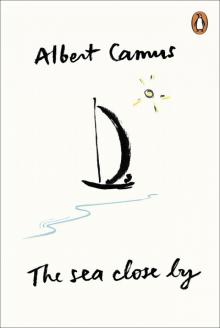 The Sea Close By
The Sea Close By The Stranger
The Stranger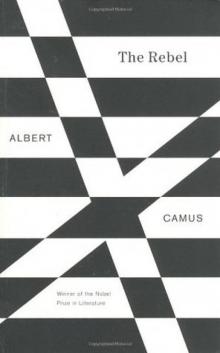 The Rebel: An Essay on Man in Revolt
The Rebel: An Essay on Man in Revolt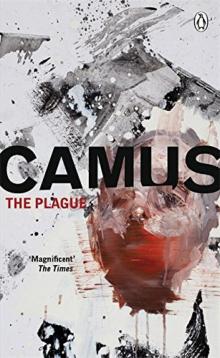 The plague
The plague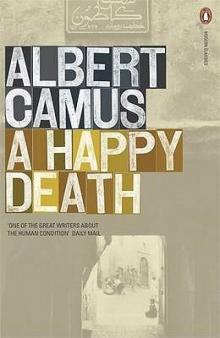 A Happy Death
A Happy Death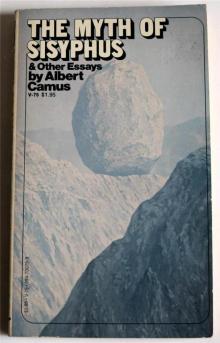 The Myth of Sisyphus and Other Essays
The Myth of Sisyphus and Other Essays The Fall
The Fall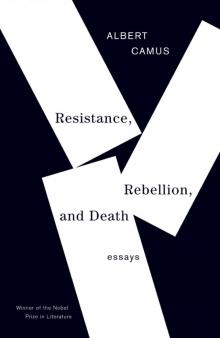 Resistance, Rebellion, and Death
Resistance, Rebellion, and Death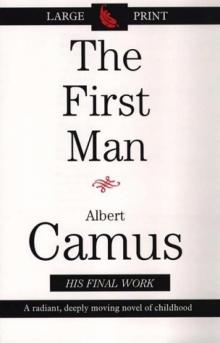 The First Man
The First Man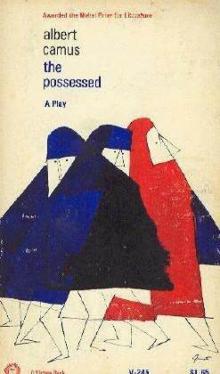 The Possessed
The Possessed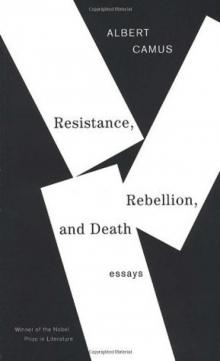 Resistance, Rebellion and Death: Essays
Resistance, Rebellion and Death: Essays